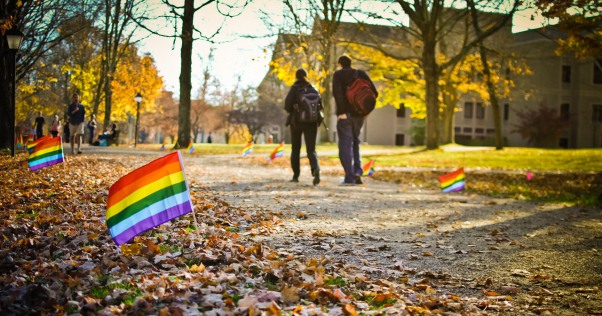Still Here, Still Queer

Posted by Samaria
October 9, 2014
The past week has brought us great news for marriage equality in the form of the Supreme Court rejecting appeals against marriage equality from five states, a decision that in turn affects anti-marriage equality laws in six other ones. While marriage equality remains on unstable ground in Idaho and Nevada, the LGBTQ community continues to see decades of struggle for the right to marry come into fruition. In the meantime, queer young adults on campus still struggle. While marriage equality undeniably helps couples and their families, for other members of the LGBTQ community it’s often irrelevant. What’s more, the disproportional attention that marriage equality receives as an LGBTQ issue over other concerns the community has underscores much of the frustration its younger members have about their place and value in the LGBTQ community. Being on campus provides a microcosm for these issues and how they play out.
Sex education consistently excludes queer young people. Before they reach college, Alabama students suffer an abstinence-only curriculum that is explicitly homophobic. Under the law, which is a little over twenty years old, the curriculum’s only mention of queer sexuality and gender is “an emphasis, in a factual manner and from a public health perspective, that homosexuality is not a lifestyle acceptable to the general public and that homosexual conduct is a criminal offense under the laws of the state.” Despite plenty of effort on the part of activists to, at the very least, remove this language from the sex education curriculum, let alone actually improve it to become comprehensive and medically accurate, the only reason that it’s being “re-examined” – not, it should be pointed out, contested – is because Alabama finally removed anti-anal and -oral sex laws from the books earlier this year.
So not only do Alabama teens receive substandard and inaccurate sex education in the first place, but queer students are barred from valuable information about what it means to be queer, made to believe that they are alone and therefore abnormal, and left without critically-important information about their particular sexual health needs as queer persons. In college, while queer young adults have greater access to the LGBTQ community and resources ̶ such as Spectrum and Safe Zone here at the University of Alabama ̶ we are still conspicuously absent from the literature and receive little to no attention from the Student Health Center, for instance.
My campus’ Student Health Center’s website’s sexual health information is both heteronormative and cissexist: it features such gems as “[women] and men express their feelings in different ways” and makes literally no mention of queer persons or LGBTQ health care anywhere, either in the sexual health section specifically or in general. There aren’t any medical professionals on staff that specialize in queer and transgender health. Considering that queer young adults face greater health risks (e.g. underage smoking, depression, and alcohol abuse) and are at greater risk for physical violence and sexual assault, it’s especially important for queer young adults receive adequate attention for our health and safety. The aforementioned isolation and societal abuse that occurs from when we are young continues into our adult years, creating a group of young people who struggle with self-love and self-acceptance due to different kinds of violence enacted on our bodies, both directly and indirectly, on multiple levels of society.
While this is slowly being challenged on other campuses, the University of Alabama’s housing department, like that of most other colleges, does not offer gender-neutral housing and only retroactively helps queer students find a safe place to live, which comes with convincing the resident advisors and the housing staff that you’re current living arrangement is actively harming you. Furthermore, while gender-neutral bathrooms are available on campus, they aren’t available in every building and dorm. There are other issues that affect queer students’ lives, such as rampant homelessness, constant violence against transgender individuals, and the absence of anti-discrimination policies that include LGBTQ persons.
Once these things are considered, marriage equality becomes a lot less glamorous, a lot less important. Civil rights for the LGBTQ community doesn’t and absolutely shouldn’t stop at marriage equality. A lot of the time, it simply doesn’t matter. Sometimes, marriage isn’t a personal goal, however much it can be a beautiful part of life. LGBTQ youth have other needs and concerns that must be met. We should not be ignored in favor of a very narrow definition of justice for the LGBTQ community.
Leave a Reply
You must be logged in to post a comment.


